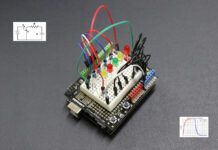 SMT also known as Surface Mount Devices (SMD) has greatly affected the manufacturing of electronics since it produced smaller, more efficient, and reliable circuitries for manufacturing small electronic gadgets. This technology concerns the affixation of electronic components onto the surface of printed circuit boards (PCBs) instead of inserting them through holes.
SMT also known as Surface Mount Devices (SMD) has greatly affected the manufacturing of electronics since it produced smaller, more efficient, and reliable circuitries for manufacturing small electronic gadgets. This technology concerns the affixation of electronic components onto the surface of printed circuit boards (PCBs) instead of inserting them through holes.
In today’s guide, we will be looking at what SMT is, the benefits accrued from it, the fields it has been adopted in, and the significance it has had on the electronics industry.
A Brief Insight into Surface Mount Technology
Surface Mount Technology is done with the aid of solder paste by mounting the electronic components on the surface of the PCB. You can visit this helpful site to learn more about PCBs. First, solder paste is applied to PCB. Usually, this is done through a stencil to make sure that the paste is properly placed.
They are then aligned and deposited on solder paste-coated land areas with the help of a fleet of machines referred to as pick-and-place machines. After all components have been installed the entire PCB undergoes a reflow soldering process which is a process of heating up the PCB in a required environment so as to melt the solder paste deposited on it, and make perfect connections between the components and the PCB.
SMT also incorporates the use of special kinds of devices known as surface mount devices (SMDs) in the exercise of the technology. SMDs are also physically smaller than through-hole parts, leading to better component packing, and in general, better utilization of space. This miniaturization is particularly important in contemporary electronics products where the sizes of the products are demanded to decrease while the functionality of the products is required to go up.

The benefits with regard to Surface Mount Technology are as follows:
Surface Mount Technology has many advantages over the through-hole technology that has dominated most of the electronics manufacturing up to the present time. It is considered to have one of the most valuable assets, namely the fact that it makes it possible to obtain a higher density of components.
SMT enables more components to be packed in a given area and that is why it has made it possible for electronic devices to be made smaller in size. This is especially the case where, as in consumer electronics, the available area is limited.
Hence another benefit of SMT is electrical performance. Since the lead length of surface-mount components is short, the inductance is comparatively lower and the resistance also is, which will increase the performance of the circuit. This is specifically helpful, especially in the areas that could require high-frequency signals in their operation, and where the integrity of signal is a crucial factor. Furthermore, the size and weight aspect of the SMDs are claimed to be smaller, which means that thermal problems will not be as prevalent since heat can easily escape.
SMT also enhances the possibility of saving costs in the manufacturing line. Automation of the manufacturing process specifically, component placing and soldering sees a cut on labor costs and time manufactured. Also, the versatility of assembling and populating components on both sides of the PCB could also mean less wastage of materials and thus more cost-effective.
SMT connections are also more dependable than through-hole connections that are easily damaged by mechanical stress and vibrations and hence the reduced maintenance and repair costs all through the life cycle of the product.
Uses of Surface Mount Technology
Surface Mount Technology is employed in many different industries and constitutes a great advantage as well as many benefits. For the consumer electronics industry, SMT is crucial for the manufacturing of smart phones, tablets, notebooks and wearable accessories. SMT has brought about compactness that can be seen to suit the current trend of having more functions installed in devices that are made with compact sizes.
In the automotive industry, SMT is applied in the manufacture of complex electronic sub-systems such as ADAS, infotainment, and ECUs. You can click the link: https://www.caranddriver.com/research/ s to learn more about ADAS. When it comes to safety as well as the effectiveness of these systems, it is highly important to have reliable and high performing SMT components.
Also, because of the features of SMT that gives the circuit the capability to withstand harsh environments, the automotive industry is well suited for SMT.
The medical industry also gets to benefit from SMT especially in the fabrication of small and efficient medical equipment for instance pacemakers, hearing aids and other diagnostic equipment.
Effect Caused to the Electronics Industry
The use of Surface Mount Technology has given a new face to the electronics industry and it has compelled technologists to look for new ways of delivering new sophistication of technologies. Some of the reasons for this have been the miniaturization and additional functionalities provided by SMT that have led to the mobility of devices and wearables changing the manner in which people encounter them.
SMT has also impacted on areas such as the Internet of Things (IoT), where devices of limited size and power are connected with a view of performing data gathering and sharing duties. Since surface mount technology has compact and technologically efficient designs to place the sensors, communication modules, and processing units, IoT applications fit this technology. In addition, the physical integration has brought about reduction in cost and improvement in production efficiency as a result of SMT leading to an increase in electronics usage.
This has given rise to the use of electronic devices in different facets of life including as consumer electronics, industrial processes, health, and many others.
All in all, Surface Mount Technology has numerous benefits when it comes to applying miniaturization, improving performance while reducing costs, and overall improving the reliability of consumer electronics manufacturing.
They primarily include electronics and mobility, as well as medical, the Internet of Things, and other consumer segments. A brief discussion on the effects of SMT in the electronics industry will inevitably include numerous benefits.


















This is a great introduction to Surface Mount Technology (SMT)! The article clearly explains the basics of SMT, including its advantages and disadvantages. For someone new to electronics like myself, this is a very helpful resource.
I found the section on the different types of SMT components particularly interesting. Are there any specific types of SMT components that are becoming more popular in recent years?
Overall, this is a well-written and informative article. Thanks for sharing!”
Additionally, you could consider mentioning:
You’re interested in learning more about the soldering process used in SMT.
You work in a field that uses SMT and you found the article to be a good refresher.
You have a question about the applications of SMT beyond the electronics industry mentioned in the article.